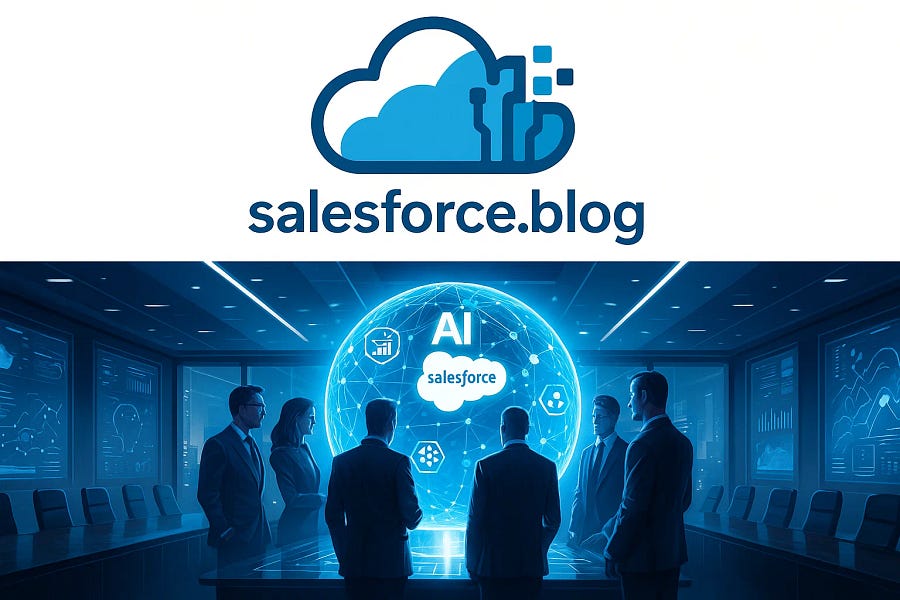Why your partner choices will define your AI transformation success
The Salesforce AI partner ecosystem in 2025 is no longer a “nice-to-have” support network — it’s the backbone of digital competitiveness. Business leaders who treat it as a procurement exercise miss the real opportunity: partners today don’t just implement, they co-create strategy, accelerate adoption, and multiply ROI far beyond Salesforce’s core offering. The smartest organizations are already shifting their C-suite focus from “Which tool should we use?” to “Which partner will transform our business model with AI?”
Business leaders face a major challenge when it comes to choosing and managing and extracting the highest value from Salesforce.com + AI partner ecosystem in 2025. The maturing Salesforce marketplace and partner community has evolved into an innovation and ROI-generating platform which makes strategic partnership selection a critical C-suite competency.
The Salesforce AI Partner Ecosystem delivers substantial value to businesses beyond its initial marketing hype.

The revenue generated by Salesforce partners exceeds $5.60 to $6 for every dollar of Salesforce revenue through their services which include implementation and ISVs and managed services and integrations and training. The external partner network drives digital transformation at the same level as internal teams because of the revenue multiplication effect. The delivery of more than 61% of Salesforce enterprise AI and Agentforce solutions happens through partner organizations instead of Salesforce direct implementation.
AI Transformation Depends on Three Essential Roles Which Salesforce Partners Must Fulfill
- Partners lead the development of specialized use cases through their work on creating customized AI workflows which generate measurable return on investment instead of basic technology deployment. The top partners assist organizations in developing new Agentforce use cases through testing and validation to demonstrate value at regular intervals.
- The Agentforce for Partner Community provides partners with continuous technical and program support through 24/7 availability and automated trial org request processing and customized AI knowledge bases which enhance delivery speed and reduce support time.
- ISVs now concentrate on developing vertical AI solutions for specific industries including healthcare and finance and manufacturing which follow all necessary operational and compliance standards.
The most successful partners use Salesforce Data Cloud and Einstein GPT to build personalized customer journeys and predictive analytics which help clients achieve market-leading differentiation.
Organizations need to follow specific guidelines when selecting and handling their Salesforce AI partners.
Your search for partners should start with organizations that demonstrate both AI expertise and industry experience and current Salesforce certifications and relevant service history for your business sector.
Every project must have specific performance-based KPIs which surpass the delivery of technical features. Your business value should remain the main focus for partners who deliver AI solutions rather than focusing solely on technical implementation.
Your selection process should focus on partners who demonstrate expertise in data architecture and migration and maintenance of secure and well-governed datasets because poor data quality represents the main reason Salesforce AI implementations fail.
The AI environment undergoes rapid changes so you need partners who provide expandable solutions and sustained post-implementation assistance for evolving platform capabilities and business requirements.
Your organization needs to establish a collaborative relationship between internal teams and partners by implementing knowledge sharing and user education programs to reduce dependence on external vendors while developing internal skills.
Before finalizing any contract you must verify that your partners maintain top security standards and stay current with all relevant data privacy regulations.
The following warning signs indicate potential issues when choosing AI partners for your business.
- The use of standardized solutions without any industry-specific customization and the promise of ready-to-use solutions without showing actual business applications.
- The emphasis on certifications exceeds the importance of client stories and innovative approaches.
- The support services after deployment are insufficient or the training programs are not well defined.
- The organization fails to provide clear information about its data management practices and privacy standards and compliance protocols.
The Salesforce AI partner ecosystem drives business transformation in 2025 when leaders make strategic choices about partners and establish KPI-based goals and maintain data responsibility and view partners as educational resources. The organizations that succeed will transform this network into a performance-enhancing system for fast operations and AI-based competitive advantage instead of treating it as a standard vendor relationship.
The winners in 2025 won’t be the companies that simply buy Salesforce licenses — they’ll be the ones that curate the right partner ecosystem, demand measurable outcomes, and build internal capability alongside external expertise. Leaders who master this balance will unlock compounding returns that competitors cannot replicate. In an AI-driven marketplace, your partner strategy isn’t just an operational decision — it’s a defining competitive advantage.



